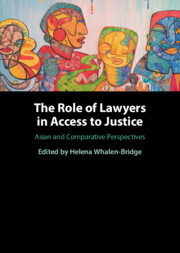Book contents
- The Role of Lawyers in Access to Justice
- The Role of Lawyers in Access to Justice
- Copyright page
- Dedication
- Epigraph
- Contents
- Figures
- Tables
- Appendices
- Contributors
- Foreword
- Acknowledgements
- Abbreviations
- 1 Understanding and Comparing Access to Justice
- Part I Access to Justice in Asia
- Part II Comparative Perspectives on Access to Justice
- 13 Access to Justice and an Islamic Ethic of Justice
- 14 Lawyering in Indonesia’s Religious Courts: Legal Aid, Procedural Justice, and Pragmatism
- 15 Access to Justice and Legal Aid in the Syariah Courts in Malaysia: A Colourful but Threadbare Patchwork System
- 16 The Syariah Court of Singapore: Achieving a More Formal Access to Justice
- 17 Access to Justice in Israel: Rights, Legal Aid, and Pro Bono in a Lawyer Dominant Environment
- 18 Vuk’uzenzele – Arise and Act: Lawyers and Access to Justice in South Africa
- Index
15 - Access to Justice and Legal Aid in the Syariah Courts in Malaysia: A Colourful but Threadbare Patchwork System
from Part II - Comparative Perspectives on Access to Justice
Published online by Cambridge University Press: 29 September 2022
- The Role of Lawyers in Access to Justice
- The Role of Lawyers in Access to Justice
- Copyright page
- Dedication
- Epigraph
- Contents
- Figures
- Tables
- Appendices
- Contributors
- Foreword
- Acknowledgements
- Abbreviations
- 1 Understanding and Comparing Access to Justice
- Part I Access to Justice in Asia
- Part II Comparative Perspectives on Access to Justice
- 13 Access to Justice and an Islamic Ethic of Justice
- 14 Lawyering in Indonesia’s Religious Courts: Legal Aid, Procedural Justice, and Pragmatism
- 15 Access to Justice and Legal Aid in the Syariah Courts in Malaysia: A Colourful but Threadbare Patchwork System
- 16 The Syariah Court of Singapore: Achieving a More Formal Access to Justice
- 17 Access to Justice in Israel: Rights, Legal Aid, and Pro Bono in a Lawyer Dominant Environment
- 18 Vuk’uzenzele – Arise and Act: Lawyers and Access to Justice in South Africa
- Index
Summary
Malaysia has a plural legal system in which civil non-religious law and Islamic/ Syariah law coexist and are adjudicated in different court systems. Indigent litigants with Syariah legal issues have some legal aid available, but the legal aid system is a colourful patchwork of limited assistance, with the different coloured threads being the different programmes offered by numerous organizations linked to government, professional associations, and civil society. While there is this colourful patchwork system in place, it is threadbare in the sense that it offers quite limited assistance with different prerequisites for eligibility, with the result that some people in need of legal advice and representation will not receive it. This chapter critically examines the different schemes of financial legal aid that provide access to justice, with a focus on Malaysia’s Syariah legal system. The chapter also reflects on how some structural aspects of the legal system, that is its plural and federal nature as well as the sentencing power, impact access to justice. It touches upon the contributions by lawyers as well as their professional associations to overcome these structural issues. It also reflects upon the legal and moral issues for lawyers representing criminal defendants in the Syariah criminal jurisdiction.
- Type
- Chapter
- Information
- The Role of Lawyers in Access to JusticeAsian and Comparative Perspectives, pp. 276 - 295Publisher: Cambridge University PressPrint publication year: 2022



